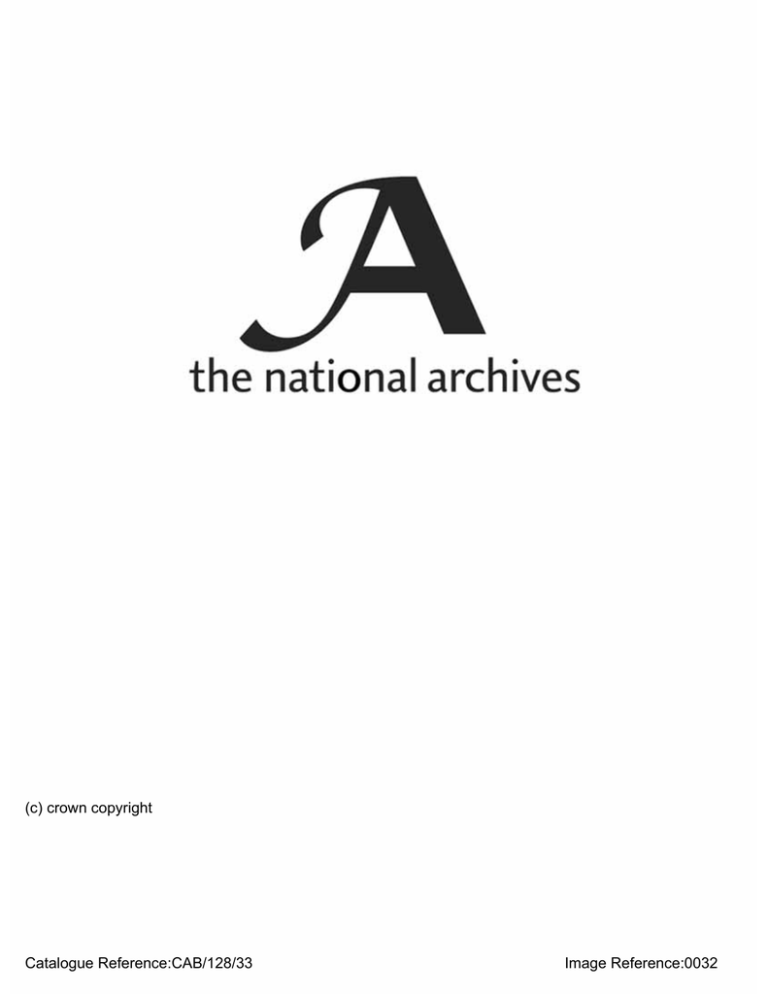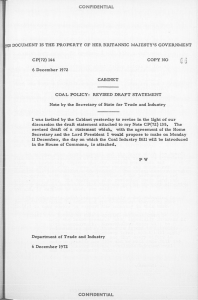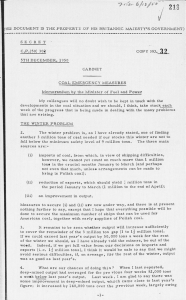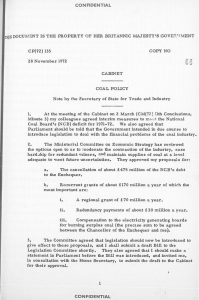(c) crown copyright Catalogue Reference:CAB/128/33 Image Reference:0032
advertisement

(c) crown copyright Catalogue Reference:CAB/128/33 Image Reference:0032 SECRET THIS D O C U M E N T IS T H E P R O P E R T Y OF H E R B R I T A N N I C MAJESTY'S G O V E R N M E N T Printed for the Cabinet. May 1959 C.C. (59) 32nd Copy N o . 32 Z'j...z.::.z-'j.-z CABINET CONCLUSIONS of a Meeting of the Cabinet held at 10 Downing on Thursday, 28th May, 1959, at 11 a.m. Street, S.W. 1, Present: T h e Right Hon. HAROLD MACMILLAN, The Right Hon. R. A . B U T L E R , M.P., Secretary of State for the Home Department and Lord Privy Seal. The Right Hon. D . H E A T H C O A T A M O R Y , M.P., Chancellor of the Exchequer. The Right Hon. V I S C O U N T H A I L S H A M , Q.C., Lord President of the Council. The Right Hon. I A I N M A C L E O D , M.P., Minister of Labour and National Service. M.P., Prime Minister. The Right H o n . V I S C O U N T Lord Chancellor (Item 7). KILMUIR, The Right Hon. J O H N M A C L A Y , M.P., Secretary of State for Scotland. The Right H o n . Sir D A V I D E C C L E S , M.P., President of the Board of Trade. The Right Hon. H E N R Y B R O O K E , M.P., Minister of Housing and Local Government a n d Minister for Welsh Affairs. The Right Hon. L O R D M I L L S , Minister The Right Hon. H A R O L D W A T K I N S O N , of Power. M.P., Minister of Transport and Civil Aviation. The Right Hon. G E O F F R E Y L L O Y D , M.P., The Right H o n . J O H N H A R E , M.P., Minister of Agriculture, Fisheries and Minister of Education (Items 1-5) Food. Dr. T h e Right H o n . C H A R L E S H I L L , M.P., Chancellor of the Duchy of Lancaster. The following were also present: The Right H o n . D . O R M S B Y - G O R E , M.P., Minister of State for Foreign Affairs. The Right Hon. E D W A R D H E A T H , M.P., Parliamentary Secretary, Treasury. Secretariat : The Right Hon. Sir N O R M A N Mr. F. Mr. M. A. BISHOP. REED. BROOK. CONTENTS Minute No. Subject 1 Parliament 2 Soviet Union "-^Ivlrs. Dmitrieva. 3 Anglo-Soviet Trade 4 Germany 5 Education Voluntary Schools. 5 Klaus Fuchs 7 Coal . . C M . 32 (59) Parliament. 1. The Cabinet were informed of the business to be taken in the House of Commons in the two weeks after the end of the Whitsun recess. Soviet Union. Mrs. Dmitrieva. 2. The Cabinet were informed of the circumstances in which Mrs. Nina Dmitrieva, the wife of an Assistant Naval Attache at the Soviet Embassy in London, was seeking political asylum in this country. F r o m discussions with her and with officials of the Soviet Embassy it had emerged that she had been- influenced more b y matrimonial difficulties than by political motives. She was, however, determined not to return to the Soviet U n i o n ; and her action in dissociating herself from the Soviet Embassy would render her liable to heavy penalties there. In these circumstances the Cabinet agreed that, if she made a definite request for political asylum in this country, it would be difficult to refuse it. And it might be expedient, in order to reduce the risk of continuing publicity, to extend to her the sort of facilities for assisting her to maintain herself in this country which were normally reserved for persons who defected for political reasons from countries within the Soviet bloc. On the other hand, with a view to avoiding damage to Anglo-Soviet relations, there might be advantage in making it clear, in any public statement, that her decision to remain in this country had been taken mainly for personal reasons. The Cabinet— Invited the Minister of State for Foreign Affairs to concert with the Home Secretary the terms of any public statement on the grant of political asylum in this country to Mrs. Dmitrieva. Anglo-Soviet Trade. (Previous Reference: C.C. (59) 23rd Conclusions, Mmute 3.) Germany. (Previous Reference: C.C. (59) 28th Conclusions, Minute 2.) 3. The Cabinet took note of the outcome of the negotiations which the President of the Board of Trade had conducted in Moscow for an expansion of Anglo-Soviet trade. The agreement reached was likely to lead to a modest increase in trade which would be of advantage to both countries. It had been reasonably well received by public opinion in the United Kingdom, and was not likely to provoke serious criticism in Allied countries. 4. The Cabinet reviewed the course of the discussions on Germany at the Geneva meeting of Foreign Ministers. The preliminary procedural arguments had been somewhat protracted, and in the formal opening statements there had seemed to be little common ground between the views of the Soviet Union and those of the Western Allies. This stage of the proceedings had now, however, been completed; and it was to be hoped that, when the conference was resumed at the end of the week, more recourse would be had to private and informal meetings, which offered a better prospect of making progress. In discussion attention was drawn to the risk that a difficult political situation might arise in this country if it were thought that the chances of a settlement on Berlin were being prejudiced by too rigid an insistence on progress towards the reunification of Germany. A substantial number of people in this country would prefer that Germany should continue to be divided, at any rate for some years to come. The strength of this opinion should not be overlooked. T h e Cabinet— Took note of these statements. Education. Voluntary Schools. (Previous Reference: C.C. (59) 31st Conclusions, Minute 4.) *5. The Cabinet resumed their discussion on the proposed new rate of grant for building work on voluntary schools. The sole question now at issue was whether it would be more advantageous politically to proceed with legislation in the current Session or to issue a statement that the Government intended to introduce legislation in the next Session. Discussion showed that the balance of opinion in the Cabinet was in favour of the former course. There was reason to think that the Bill would be acceptable to the Governments supporters in Parliament and that it would receive substantial support from the other two political parties. Widespread and damaging religious controversy was less likely if the Governments proposals were passed quickly into law than if the issue continued to remain open. Moreover, delay would give an impression of indecision on the part of the Government; and this, while it would do little to mitigate the opposition of the Free Churches, might lead the Roman Catholic Church, who were prepared to accept the present proposals, to press for a more extensive scheme of assistance to voluntary schools. It was, however, desirable that a further attempt should be made to bring the Free Churches to acquiesce in the proposals. It could be demonstrated to them that the dual system of education was to be maintained but not extended. It should be made clear that the payment of grant o n new secondary schools would be limited to those strictly required for the education of children who were at present in denominational primary schools. Much of the opposition might be assuaged if it were understood that the new grant would not be payable on secondary schools provided to match further denominational primary schools built at some time in the future. In further discussion it was pointed out that time could probably be found for the passage of the Bill during the current Session, although in certain circumstances this might involve abandoning some Bills which were to be introduced in the House of Lords. It would therefore be preferable to make no announcement of the Governments intention to proceed with the Education Bill (which was ready for introduction) during the present Session until more was known of the progress of the Parliamentary programme. The Cabinet— (1) Agreed in principle that legislation should be introduced during the current Session to extend the system of grants for the building of denominational schools. (2) Agreed that for the time being no announcement on this subject should be made. (3) Took note that the Prime Minister, in consultation with the Lord Privy Seal and the Chief Whip, would decide the date on which the Bill should be introduced. Klaus Fuchs. 6. The Cabinet considered a memorandum by the Home Secretary (C. (59) 89) on the impending release of Klaus Fuchs, who would complete in June the sentence of imprisonment imposed on him in 1950 for offences under the Official Secrets Acts. The Home Secretary said that Fuchs had indicated that, after his release from prison, he would wish to join his father in Leipzig. There was no effective way of preventing him from doing this: he was no longer in possession of any secret information which would be useful to an enemy: and it was proposed to give him such facilities as were necessary to enable him to travel to East Germany. It was CM. 3 2 (59) recommended that a statement to this effect should be made, in reply to a Parliamentary Question, in the terms of the draft annexed to C. (59) 89. The Minister of State for Foreign Affairs said that this might give rise to critical comment in some circles in the United States. It was not, however, likely to provoke any formal protest from the United States Government, who had already been warned that Fuchs might go to East Germany and understood that we: had no effective means of preventing him from doing so. It might however be preferable if the proposed statement followed the line that, as Fuchs had been deprived of his British nationality, it would not be for the United Kingdom Government to determine where he should live after his discharge from prison. The Cabinet— Took note of C. (59) 89; and authorised the Home Secretary to arrange for an announcement to be made in the terms of the draft annexed to the memorandum, subject to the amendment proposed by the Minister of State for Foreign Affairs. Coal. (Previous Reference: C.C. (58) 47th Conclusions, Minute 4.) 7. The Cabinet had before them a memorandum by the Minister of Power (C. (59) 90) on the problems facing the coal industry. The Minister of Power said that, although the total demand for fuel in the United Kingdom had not fallen in 1958, despite the lower level of industrial activity, the demand for coal had fallen on account of the increasing use of oil. The percentage of coal consumed, in relation to total fuel requirements, had dropped from 93 per cent, in 1938 to 80 per cent, in 1958 and the percentage of oil had risen from 7 per cent, to 19 per cent. In the light of this increasing use of oil the National Coal Board "were revising their estimate of the future demand for coal. Their provisional assessment, after allowing for a recovery in industrial activity and for increasing demands from power stations, was that demand in 1965 would be about 210 million tons, including coal for export, and that over the next year or so it would probably not exceed 200 million tons. It was estimated that about 208 million tons would be produced in 1959, and this would entail a substantial addition to the high level of undistributed stocks. The National Union of Mineworkers, with the support of the Opposition, favoured the adoption of protectionist measures, including a tax on fuel oil. The Chairman of the Coal Board, who had hitherto considered that the coal industry should make itself competitive with other fuels, had now suggested that, in order to stimulate demand, the price of East Midland small coals for sale in the south of England and the price of Durham gas coals should be reduced by 5s. Od. a ton. He proposed, however, that this should be offset by increasing the price of coals for sale in Scotland by 5s. 9d. a t o n ; or that, if this were not acceptable, the market for coal should be safeguarded by procuring an agreement with the oil companies to restrict any increase in the use of fuel oil for a period of two years. A tax on oil would weaken the competitive efficiency of British industry, and would d a m a g e the overseas position of the oil companies. Indeed, any restriction on the increasing use of oil fuel would have serious repercussions, both on our foreign relations, especially with the countries of the Middle East, and on our balance of payments. . * wi o \ If the policy of freedom of choice for the consumer were continued, the coal industry must contract.- This would entail a phased programme for closing pits and discontinuing opencast production. On the other hand, new power - stations were being designed for coal burning, and the programme for building nuclear power stations was being examined in order to increase generating^ demand for coal as far as possible. U There was room for a comprehensive revision of the existing price structure. But the particular proposals made by the Chairman of the Coal Board were commercially unsound and too discriminatory. The Minister therefore proposed to inform the Chairman that the Government could not accept these proposals or the suggestion of restrictions on the use of oil, and that it was not possible to consider the long-term problems of the coal industry until the Board had completed their reappraisal. In discussion the following points were m a d e : — (a) Further consideration should be given to the cost of cancelling contracts for opencast mining on sites where operations had not actually been started. (b) Coal was our main raw material. There were obvious strategic dangers in becoming unduly dependent on imported oil. The possibility of some form of protection for the coal industry ought not, therefore, to be completely excluded. (c) It was important to press on with scientific research into the use of coal and the development of coal derivatives, including oil. (d) In view of the continuing increase in stocks, it might be right, as part of a comprehensive review, to reduce coal prices, even though this involved some immediate loss to the Coal Board, if this would stimulate a continuing demand. Summing up the discussion, The Prime Minister said that, in the special circumstances of the coal industry, the Governments fuel policy ought not to be based on too rigid an application of a policy of freedom of choice. It should rather be determined by practical considerations. The longer term problems of the industry should be examined by the Economic Policy Committee as soon as the Coal Board had completed their review of future demand and the programme for the rationalisation of the industry which this would involve. T h e Chairman of the Board should be informed that the discriminatory price changes which he had suggested were not acceptable in advance of comprehensive proposals for improving the coal price structure, and that the alternative proposal for a limitation on the home demand for oil was not practicable. Meanwhile, opencast mining operations should be ended as soon as was possible having regard to the cost of cancelling existing contracts. The C a b i n e t ­ (1) Invited the Minister of Power to inform the Chairman of the National Coal Board that the proposals described in paragraph 6 of C. (59) 90 were unacceptable. (2) Invited the Minister of Power to consider the possibility that the run-down of the opencast programme might be accelerated by cancelling some contracts for sites on which operations had not been begun. (3) Invited the Minister of Power to circulate in due course a memorandum on the longer-term problems of the coal industry, for consideration by the Economic Policy Committee. 0



